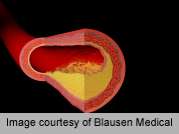Sclerostin linked to vascular disease in type 2 diabetes

(HealthDay)—Circulating levels of the Wnt/β-catenin signaling inhibitor sclerostin are higher in patients with type 2 diabetes who also have atherosclerotic disease, according to a study published online Jan. 3 in Diabetes Care.
Noting that Wnt/β-catenin signaling is related to the pathology of various diseases, Sonia Morales-Santana, Ph.D., from the Hospital Universitario San Cecilio in Granada, Spain, and colleagues measured serum sclerostin levels in 78 patients with type 2 diabetes mellitus, of whom 44 had atherosclerotic disease.
The researchers found that patients with atherosclerotic disease had significantly higher serum sclerostin levels, with a 4 percent increase in the risk of atherosclerotic disease for each 1 pmol/L increase in sclerostin. A sclerostin cut-off of 42.3 pmol/L could detect an increased risk of atherosclerotic disease with a sensitivity of 69 percent and a specificity of 54.8 percent. Higher sclerostin levels were associated with abnormal intima-media thickness and aortic calcification in both men and women, and with carotid plaques in men only. Homocysteine levels and intima-media thickness were positively correlated with sclerostin.
"Circulating sclerostin is increased in type 2 diabetes mellitus patients with atherosclerotic lesions," Morales-Santana and colleagues conclude.
More information:
Abstract
Full Text (subscription or payment may be required)
Health News Copyright © 2013 HealthDay. All rights reserved.


















